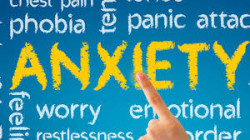Anxiety Basics

Anxiety is typically characterized as feelings of nervousness, uneasiness, apprehension, worry, or even dread. It is fairly common, perhaps even natural, to experience anxiety in certain stress inducing situations. Most people can recall experiencing numerous anxiety provoking situations (i.e. taking an important test, waiting for a loved one to come out of surgery, getting lost or losing a child in an unfamiliar place, or even just getting on a monster-size roller coaster). Anxiety experienced under such circumstances is situational, and the causes are both clear and understandable. Some people, however, experience anxiety routinely (but with no apparent cause), in any number of unexpected situations, and often with a potentially debilitating intensity. Such people may actually be suffering from an anxiety disorder (i.e. Generalized Anxiety Disorder, Social Anxiety Disorder, Phobias, Panic Disorder, and Post-Traumatic Stress Disorder, etc).
Here are a few Facts & Statistics about anxiety disorders.
- Anxiety disorders develop from a complex set of risk factors, including genetics, brain chemistry, personality, and life events.
- Anxiety disorders are the most common mental illness in the U.S., affecting 40 million adults in the United States age 18 and older (18% of U.S. population).
- Anxiety disorders are highly treatable, yet only about one-third of those suffering receive treatment.
- People with an anxiety disorder are three to five times more likely to go to the doctor and six times more likely to be hospitalized for psychiatric disorders than those who do not suffer from anxiety disorders.
via Facts & Statistics | Anxiety and Depression Association of America, ADAA.
Although anxiety is generally characterized by emotional distress, it is not uncommon for physical symptoms to accompany the emotional discomfort. Physical symptoms include a wide range of possibilities, but some of the most common ones are headaches, body aches, nausea, shortness of breath, sweating, and pounding heart. Depending upon the specific disorder a person suffers from, the combination of physical and emotional symptoms can sometimes be overwhelming, and even feel life threatening.
My personal experience has been with both the emotional and physical symptoms of anxiety. Throughout my younger years, my anxiety was primarily experienced as an ever-present sense of uneasiness and generalized fear. Overtime, however, my anxiety progressed to full-blown panic attacks including pounding heart, shortness of breath, inexplicable pain, etc.
Although there was definitely a progression in intensity over the years, anxiety was a part of my life for as far back as I can recall (3-4 years old). And based on what I know about my mom’s experiences during her pregnancy, it is highly likely that I was experiencing anxiety even in the womb. Without question, my exposure to paternal alcoholism and domestic violence for the 1st six years of my life, definitely played a role in my lifelong struggle with anxiety.
Although the origin of my anxiety issues are fairly apparent, for many, there are no obvious precursors to their anxiety struggles. Regardless of what predisposes us to anxiety, anxiety disorders have the potential to severely disrupt our lives. Sadly, many of us erroneously believe that what we experience is just a part of who we are, and that there is nothing we can do about it. Alhumdulilah–I know for a fact that anxiety is not who we are, and there is much that we can do to minimize (possibly even eliminate) the often agonizing symptoms of anxiety. Although I am not completely free of my anxiety issues, I no longer suffer from the most intense or overwhelming symptoms that I once did. Allah has guided me to some invaluable tools that have substantially reduced the burden of living with anxiety. My most powerful tools for anxiety include Dhikr, meridian tapping, meditation, and mindfulness; all of which I will expound upon in separate articles. Until then, I leave you with one of my favorite Duas (supplications)/Dhikrs (remembrance of God):
حَسْبِيَ اللهُ لَآ إِلَهَ إِلَّا هُوَ عَلَيْهِ تَوَكَّلْتُ وَهُوَ رَبُّ الْعَرْشِ الْعَظِيمِ
Translated as: “Allah is sufficient for me. There is none worthy of worship, but Him. I have placed my trust in Him and He is the Lord of the Majestic Throne.”
Transliteration:’Hasbiyallaahu laa ‘ilaaha ‘illaahuwa ‘alayhi tawakkaltu, wa huwa rabbul-arshil-adheem.’
Recite this:- At least 7 times Every Morning and Evening
Wisdoms/Benefits:
– Acknowledging one’s complete reliance on Allah (tawakkul), whilst maintaining and seeking the means to achieve.
– Enourages one to proceed in doing good action without fearing or dreading anyone but Allah.
– Allah will love him and suffice him in whatever he is trying to achieve
– Challenge: Take action but do not rely on it. Place your trust fully on Allah
via IslamicAnswers.com: Islamic Advice | Morning and Evening Dhikr – Part 5.
 Copyright secured by Digiprove © 2014 Nailah Johnson
Copyright secured by Digiprove © 2014 Nailah Johnson
Beautiful. Shukran, jazak’Allah for this du’a.
Alhumdullilah. I love that dua. So powerful.